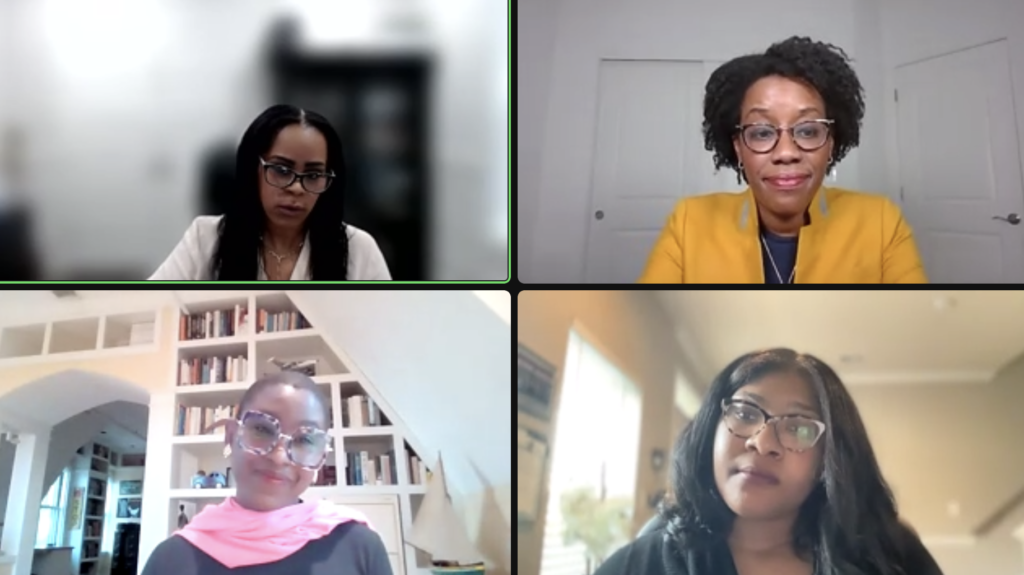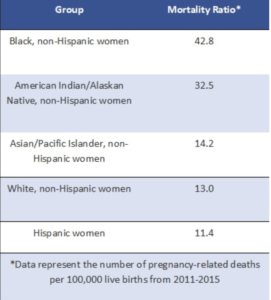Black Reproductive Health Panel Discusses Concerns, Needed Action in the Wake of Dobbs v. Jackson
The day Politico leaked the Dobbs v. Jackson Women’s Health Organization majority opinion is a moment most Americans won’t soon forget. On June 24, 2022, the Supreme Court overturned Roe v. Wade and held that abortion is not a constitutional right, returning the authority to regulate abortion to the states. Since then, abortion has been banned in at least 13 states with no exceptions for rape or incest. And in these states, there is concern that without Roe v Wade, one population in particular will suffer disproportionately: Black Americans.

In a virtual discussion co-sponsored by the Stanford Law School Black Alumni Association and Stanford Center for Racial Justice, moderator Dacia Russell Goman (top left), MD, JD ’05, FAAEM, began by citing “shocking disparities” in Black reproductive health from the Center for Disease Control and Prevention. “Black women are three to four times more likely than white women to experience a pregnancy related death or serious complication […] even when we control for factors like body mass index, socioeconomic status, and education,” Russell Goman said. She then opened the conversation to the three esteemed panelists, Congresswoman Lauren Underwood (D-IL, top right); Michele Goodwin, Chancellor’s Professor of Law at the University of California, Irvine; and Christine Slaughter, Assistant Professor of Political Science at Boston University.
When asked to define Black maternal health, Goodwin focused on the origin stories of the federal and state laws that made Black women and their children “reproductive chattel” in the early U.S. colonies. Goodwin highlighted the story of Margaret Garner, an enslaved woman who killed her own children in an attempt to save herself and her children from the horrors of slavery. She pointed out how similar stories like Garner’s influenced the relationship between the law and Black mothers in America.
Congresswoman Underwood presented a policy definition based on her Congressional advocacy for laws expanding access to maternal care for Black mothers, such as the Black Maternal Health Momnibus Act of 2021. She described the current policy space as one of progress and regression due to awareness of the Black maternal health crisis in the wake of the Dobbs decision. Now, she implored, we have an important choice to make for Black reproductive health.
Slaughter stated that for Black women and Black maternal health, “the personal is political.” She explained that Black women often engage in politics for the sake of protecting their own interests, well-being, lives, families, and communities due to the simultaneous influences of policy and politics on Black maternal health. She echoed Congresswoman Underwood’s point that the duality of politics forces Black women to vote for policies that protect them and fight against those that harm them.
Throughout their discussion, all three panelists detailed the various environmental, social, legal, economic, and political factors that encapsulate the current disparities in reproductive health for Black Americans. As reproductive rights face growing restrictions, the experts mentioned pre- and post- pregnancy reproductive health issues such as sexual education, contraception, clinic accessibility, and maternal mortality as areas that continue to cause long lasting health complications among Black Americans.

And while these women have drafted, analyzed, and published some of the leading policies on Black reproductive health, the panelists closed by reminding the audience of the power of personal stories in conversations about Black reproductive health.
Congresswoman Underwood referred to a documentary called “Aftershock” and called on non-birthing people to advocate for better maternal health policy. Slaughter emphasized the importance of intergenerational dialogue, so birthing stories can transform the future of Black reproductive health. Lastly, Goodwin added the need for Black reproductive policy issues to be translated into language that voters can understand, especially as courts continue to systemically suppress and disenfranchise Black voters, she said.
After their Q&A, each expert implored attendees to pay attention and participate in local elections. “All elections matter,” Congresswoman Underwood said, especially as bills restricting and expanding reproductive health are presented in state and federal legislatures.
At the close of the discussion, the experts expressed gratitude for one another’s work and diligence in highlighting these issues, exhibiting a warmth that seemed paradoxical to the severity of the threat just discussed. It was a critical reminder that for all of these panelists, “the personal is political” serves as a call to action bigger than themselves.
